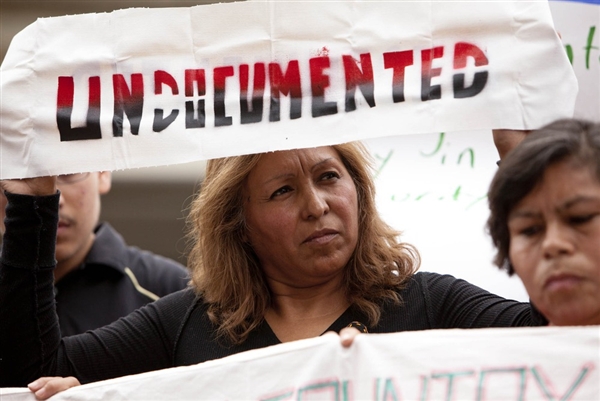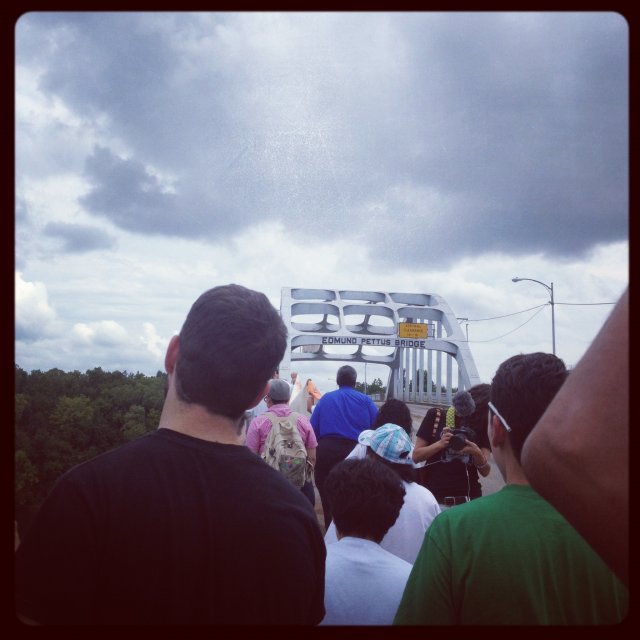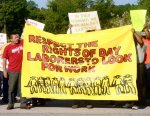Destinations
-
When we go to Knoxville.
August 26, 2012
Riding a bus for weeks at a time as an undocumented immigrant can be a little intimidating. Stopping in cities and towns where there is a clear risk of arrest and jail means overcoming fear. Still, along with my fellow undocumented passengers of the "No Papers, No Fear Ride for Justice," I'm looking forward to our visit to Knoxville as we head toward Charlotte, N.C., and the Democratic National Convention at the beginning of September.
I am on the bus because it is time for undocumented people like me who live, work, study and organize in this country to come out of the shadows. It's time to change the laws so that people like me and my family don't have to live in fear of jail, deportation or separation. It's time for people in the United States to understand that we are human and we are home, regardless of where we were born or what our immigration status is.
I've been in the United States since I was 7 years old, My dad, who was having a hard time finding work in Mexico, moved after being offered a job in Chicago. To make sure my sister and I grew up with our father, my mother made the choice to move with him to the U.S. After our visas expired, we became undocumented.
Read More » -
Timelapse: The Making of the (undocu)bus
August 26, 2012
-
Somos Tuscaloosa: Tornados and Anti-Immigrant Terror
August 26, 2012
The No papers no fear ride rallied with Somos Tuscaloosa on their anniversary to recount stories of surviving last year's tornado and organizing in response to Alabama's HB56.
Read More » -
Principios y Valores: Cómo construir un comite
August 26, 2012
-
Bien Organizados en Tifton, GA
August 26, 2012
-
Melissa Harris Perry: No Papers No Fear Footsoldiers
August 26, 2012
-
Atlanta Rallies Outside Detention Center
August 26, 2012
-
Undocumented mom risks life in US to join immigration fight
August 25, 2012

Birmingham, Ala. -- Maria Cruz Ramirez thrust up a small banner reading “undocumented,” interrupting a hearing on strict state immigration laws to share the impact that the legislation has had on her life.
“I am here to lift up the voice of my community, of my children, all those families who have been separated. I am here and I want to present this so you can see it,” Ramirez, 46, cried out in Spanish as she held up the sign at the meeting in Birmingham. “I am a mother, a responsible mother … I am not a criminal and I am here to defend my rights.”
A mother of three and former owner of a hair salon in Mexico, Ramirez, who lives in Arizona, never thought she would end up here, as an immigration activist, possibly jeopardizing her life in the U.S. But after 11 years in this country, she decided to throw herself into the public spotlight as Arizona’s crackdown on undocumented immigrants threatened her family.
Read More » -
Selma: Crossing Bridges, Building Puentes
August 23, 2012

Today we had the privilege to visit Selma, Alabama, a historic site from the Civil Rights movement. On a Sunday in March of 1965, around 600 marchers left Selma to march east to the capital. When they reached Edmund Pettus Bridge, only six blocks away, they were driven back to Selma by state troopers and local sheriffs who used tear gas and billy clubs to stop them in their tracks. This event became known as Bloody Sunday. Alabama State Senator and civil rights activists Hank Sanders invited us to come meet with him and other long time activists from the area. This is how we, Isela Meraz, a 29 year old undocumented and queer organizer from Arizona, and Maria Huerta, a 65 year old domestic worker and organizer from California, both remember that visit:
Maria: Today was a really exceptional day for me. The bridge in Selma is a really important part of history. It was very intense walking over the bridge. They had no idea they were going to run in to problems there. The women told us that there was a lot of blood and that lots of people had died. As we walked over the bridge, I thought of all of the kids that had died. There fight was and is really the same as ours – lots of racism, hate, and segregation.
Read More » -
Witnessing the Birth of a Day Laborer Worker’s Center
August 22, 2012

Members of the No Paper No Fear ride visited a group of day laborers in Hoover, Alabama, who had requested support in organizing. Eleazar is himself a day laborer in Tucson, Arizona, and he was part of the team that helped these workers organize themselves.
It was a great experience in my life, to witness how a group of day laborers organized for dignity in their living conditions and the right to look for work. They were being harassed by the police, ignored and criminalized by their housing administrator, and fearful of being deported. On Friday, we took a small group of No Papers No fear riders, to learn from them about the conditions they lived and worked in, and support their organizing; on Sunday, we held a meeting with the tenants and the day laborers, and on Tuesday we brought the entire group to support a demonstration led by the day laborers for their right to work and good living conditions.
Read More »